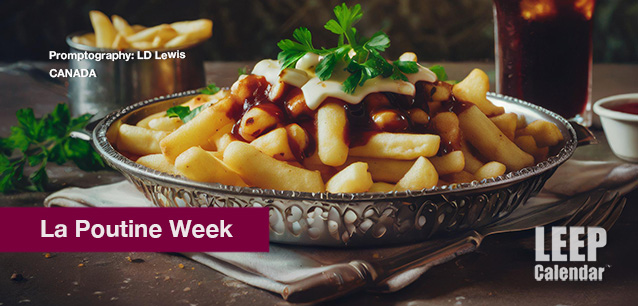 AD
AD
Today is: December 12
Scroll to explore events active on this date.
Additional Events on LEEP
LEEP INK FEATURES

August? Absolutely!
In August, we live through the Dog Days of Summer. It's hot and often humid, and those who can leave for better climates do. Down south, winter is in full force. August is also known as "the ...

In The Heat of July: July 2025 Events
Is it hot enough (or cold enough if you're below the equator) for you yet? There is actually a day for that! Like every month, I pick a diverse collection of events you may or may not know about. This ...

May Blooms: Events in May 2025
Along with October, May is one of the most densely packed months of the year. It's before the summer humidity and the last whole month of the school year. The weather is warming in t...
About Canada's La Poutine Week
Canada
Ends: Feb 07, 2025
DESCRIPTION:
La Poutine Week is an annual celebration dedicated to Quebec's iconic dish, poutine, which originated in Canada's predominantly French-speaking province. This gastronomic event, launched in 2012, was conceived by Na'eem Adam and Thierry Rassam, the same duo who initiated Le Burger Week. Their vision was to create a festival that celebrates but elevates poutine, a humble dish of fries, cheese curds, and gravy, to new culinary heights.
Poutine is a beloved Canadian dish, particularly famous in the province of Quebec, where it is widely considered a culinary staple. The dish has humble beginnings and a somewhat unclear origin story but has risen to iconic status over the years.
HISTORY OF POUTINE
Poutine originated in rural Quebec, Canada, in the 1950s.
Its invention has several claims, but the prevailing legend is poutine was created in Warwick, Quebec, by a restaurant owner named Fernand Lachance. When a customer requested the addition of cheese curds to his fries, Lachance is said to have exclaimed, "Ça va faire une maudite poutine!" ("That's going to make a damn mess!"), thus giving the dish its name.
Poutine was initially seen as a dish of the working class and shunned in haute cuisine circles. Over time, however, it gained popularity across all sectors of society.
INGREDIENTS AND PREPARATION
Poutine is a simple dish with three key ingredients:
French Fries— the dish's base is traditionally made from fried hand-cut potatoes until they are crispy on the outside but still soft inside.
Cheese Curds—Fresh cheese curds are essential for an authentic poutine. They should be soft, have a mild flavor, and are typically added while squeaky fresh.
Gravy—A hot brown gravy, often made from beef and chicken stock, is poured over the fries and cheese curds. The gravy should be light enough not to make the fries soggy but thick enough to coat them.
The dish is typically served hot, with the cheese curds partially melted by the heat of the gravy and fries. Poutine's appeal lies in its combination of textures and flavors: the crispiness of the fries, the chewiness of the cheese, and the rich, savory flavor of the gravy.
CELEBRATING POUTINE
Over the years, poutine has evolved, with numerous variations emerging. Restaurants and chefs have experimented with adding additional ingredients such as meats, vegetables, and different sauces, transforming it from a simple, fast food item into a gourmet dish. Despite these variations, the heart of poutine remains the unique combination of fries, cheese curds, and gravy.
La Poutine Week's primary purpose is to showcase poutine's versatility and culinary potential. It encourages local restaurants and chefs to experiment with this traditional dish, creating unique and innovative variations. This event has become a platform for culinary creativity, where classic poutine is reimagined with diverse and sometimes unexpected ingredients, appealing to various tastes and preferences.
Originally, La Poutine Week was a local event in Montreal, Quebec, where poutine maintains status in the province's culinary culture. However, its popularity quickly grew, and the event expanded to include other cities across Canada. La Poutine Week took a little while to gain international recognition, with restaurants worldwide participating in the festivities.
During the event, which typically takes place in February, participating restaurants offer their unique poutine creations to the public. Customers sample various renditions and vote for their favorites. This interactive component engages the community and fosters a competitive spirit among chefs and restaurants.
La Poutine Week also often incorporates a charitable element, with many restaurants donating some of their proceeds to local charities. This aspect of the event highlights the organizers' commitment to community involvement and social responsibility.
In summary, La Poutine Week, originating in Quebec, Canada, is a testament to poutine's enduring popularity and cultural significance. What started as a celebration of a local dish has transformed into an international culinary event, drawing participants and enthusiasts from around the globe. It showcases the innovative spirit of chefs and restaurants while fostering community engagement and supporting charitable causes.
VIDEOS
SUPPORTING DOCUMENTS
Currently, this event does not have supporting documents.
ADDITIONAL IMAGES
Currently, this event does not have supporting images.
Where would you like to go now?
 AD
AD


/footer-logo.svg)
